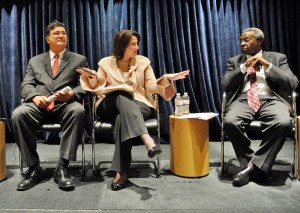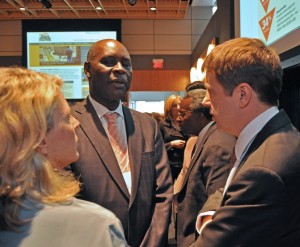Frontline Health Workers Coalition Launch

Courtesy Kate Holt/Jhpiego
Coalition launch underscores value of investing in frontline health workers.

Dee Dee Myers, former press secretary to President Clinton, serves as moderator.
Credit: Sarah Dwyer
On January 11, 2012, the Frontline Health Workers Coalition was launched at an event in Washington, DC, featuring a high-level panel moderated by Dee Dee Myers, managing director of the Glover Park Group and former White House press secretary for President Clinton. Panelists included Dr. Ariel Pablos-Méndez, assistant administrator for global health at USAID; Anita McBride, former chief of staff to First Lady Laura Bush; Dr. Peter Ngatia, director of capacity building, AMREF; and Duncan Learmouth, senior vice president of developing countries and market access, GlaxoSmithKline. The standing-room-only audience of more than 150 included senior representatives of coalition members and corporate partners, the U.S. government, foundations, the media, and others from the global health community. In her opening remarks, Save the Children President Carolyn Miles talked about the shortage of 1 million frontline health workers, and the call to action from the coalition for the U.S. government to support 250,000 new frontline health workers, and to support existing health workers. "These health care providers can, at a low cost, provide desperately needed services," she said. Miles emphasized the key role frontline workers play in delivering lifesaving care and support, as well as the need for more health workers. "A coalition like this is so critical," said Anita McBride. "The U.S. government cannot do it alone, and the U.S. taxpayers need to know that the government is not doing it alone." McBride, who said she was looking at this issue from "a bird’s eye view," underscored the importance of U.S. leadership in addressing global health problems.
 Courtesy Kate Holt/Jhpiego. Read the FHWC blog for new posts every week on how US investments in frontline health workers are making an impact → Read the latest news from the Coalition →
Courtesy Kate Holt/Jhpiego. Read the FHWC blog for new posts every week on how US investments in frontline health workers are making an impact → Read the latest news from the Coalition →"It is critical that the U.S. lead on humanitarian issues," she said, adding that "We need to understand and make better arguments to the American people" reminding the audience about the need to show people that "these humanitarian issues are national security issues as much as economic issues." "We are happy to see this partnership," said Dr. Ariel Pablos-Méndez. He talked about the "incredible revolution" in global health advances, adding that "positioning health workers as the face of the health system is the way to go." "Frontline health workers are the unsung heroes of the health care system," said Dr. Peter Ngatia, who has spent 30 years working with frontline health workers. He spoke of health workers in Ethiopia who "struggle to save lives every day," quoting one who told him, "Sometimes I wish I had more hands, and, at the end of the day, I think we would have done better if we had more hands and more health workers." Dr. Ngatia also spoke of the situation in the world’s newest country, South Sudan: "It is a crime that so many children and mothers die because there is not a frontline health worker there." He called on the U.S. government to continue to play a leadership role. "We need more frontline health workers, and the USA has a role to play. Good health means economic development," Dr. Ngatia said.

Panelists included Dr. Ariel Pablos-Méndez, assistant administrator for global health at USAID; Anita McBride, former chief of staff to First Lady Laura Bush; and Dr. Peter Ngatia, director of capacity building, AMREF.
Credit: Sarah Dwyer
"We are very enthusiastic about this initiative," said Duncan Learmouth, who represented the private sector partnership in the coalition. Learmouth talked about the key role of the private sector can play in ensuring that health workers have the tools and medicines they need. "We need to make sure that frontline health workers can do their job," he said. "They need access to medicines and supplies to be motivated, to be able to work," Learmouth said. "It’s not just philanthropy," he added. "It’s all about sustainable investments." "People understand the importance of health workers in their lives," said Myers, thanking panelists for "putting a human face on the issue" of global health. Following panelists’ comments, she asked them about the long-term impact of ensuring that more frontline workers are on-the-job, serving people in need. Dr. Pablos-Méndez responded, "This is not a stopgap measure. It’s all about sustainability, about making systems stronger." He spoke of the U.S. government’s Global Health Initiative, which "supports integration, including integrated training.

Duncan Learmouth, senior vice president of developing countries and market access, GlaxoSmithKline (r) speaks with Carolyn Miles, President & CEO of Save the Children, and Pape Gaye, President & CEO of IntraHealth International.
Credit: Sarah Dwyer
Training of health workers is essential for all programs. We see the training of health workers as paramount to all of our programs. All of our investments need to be building on this." Myers added that it is important not only to invest, but also to share success stories. "We need to educate every generation of Congress, every generation of Americans, about global health and development." McBride also said that it is important to communicate. She said, "Keep at it, one by one. Keep telling the stories." Learmouth spoke of the need to communicate, and to "be honest about it, about successes and failures. We have had an impact, but have not always built infrastructure horizontally. That’s why this is so important now." Pape Gaye, president and CEO of IntraHealth International, closed by thanking panelists and participants, and highlighting the importance of leveraging partnerships and collaborating at all levels. "What we saw in this room today," he said, "will be a microcosm of what can happen in the world when we join forces." Gaye reminded participants that frontline health workers are a "smart investment" and that "investing in a healthy world is good for all of us."
